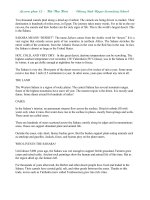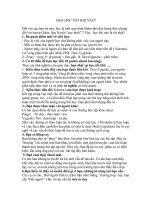Turn about eleanor
Bạn đang xem bản rút gọn của tài liệu. Xem và tải ngay bản đầy đủ của tài liệu tại đây (683.12 KB, 179 trang )
TheProjectGutenbergEBookofTurnAboutEleanor,byEthelM.Kelley
ThiseBookisfortheuseofanyoneanywhereatnocostandwith
almostnorestrictionswhatsoever.Youmaycopyit,giveitawayor
re-useitunderthetermsoftheProjectGutenbergLicenseincluded
withthiseBookoronlineatwww.gutenberg.net
Title:TurnAboutEleanor
Author:EthelM.Kelley
Illustrator:F.GrahamCootes
ReleaseDate:March29,2009[EBook#28444]
Language:English
***STARTOFTHISPROJECTGUTENBERGEBOOKTURNABOUTELEANOR***
ProducedbyRogerFrankandtheOnlineDistributed
ProofreadingTeamat
TURNABOUTELEANOR
Eleanor
TurnAboutEleanor
By
ETHELM.KELLEY
ILLUSTRATEDBY
F.GRAHAMCOOTES
INDIANAPOLIS
THEBOBBS-MERRILLCOMPANY
PUBLISHERS
COPYRIGHT1917
THEBOBBS-MERRILLCOMPANY
PrintedintheUnitedStatesofAmerica
PRESSOF
BRAUNWORTH&CO.
BOOKMANUFACTURERS
BROOKLYN,N.Y.
TOMYMOTHER
CONTENTS
CHAPTER
I
II
III
IV
V
VI
VII
VIII
IX
X
XI
XII
XIII
XIV
XV
XVI
XVII
XVIII
XIX
XX
XXI
XXII
XXIII
XXIV
XXV
PAGE
ENTERELEANOR
THECOOPERATIVEPARENTS
THEEXPERIMENTBEGINS
PETERELUCIDATES
ELEANORENJOYSHERSELFINHEROWNWAY
JIMMIEBECOMESAPARENT
ONEDESCENTINTOBOHEMIA
THETENHUTCHINSONS
PETER
THEOMNISCIENTFOCUS
GERTRUDEHASTROUBLEWITHHERBEHAVIOR
MADAMBOLLING
BROOKANDRIVER
MERRYCHRISTMAS
GROWINGUP
MARGARETLOUISA’SBIRTHRIGHT
AREALKISS
BEULAH’SPROBLEM
MOSTLYUNCLEPETER
THEMAKINGSOFATRIPLEWEDDING
ELEANORHEARSTHENEWS
THESEARCH
THEYOUNGNURSE
CHRISTMASAGAIN
THELOVER
1
14
27
40
48
63
72
84
101
113
124
138
158
167
181
195
203
219
234
251
261
271
281
292
304
TURNABOUTELEANOR
1
TURNABOUTELEANOR
CHAPTERI
ENTERELEANOR
A child in a faded tam-o’-shanter that had once been baby blue, and a shoddy
coatofaglaring,unpropitiousnewness,wassittinguncomfortablyontheedge
ofahansomseat,andgazingsoberlyoutatthetrafficofFifthAvenue.
Theyoungmanbesideher,ablond,sleek,narrow-headedyouthineye-glasses,
wasliterallymakingconversationwithher.Thatis,hewasengagedinapalpable
effort to make conversation—to manufacture out of the thin crisp air of that
NovembermorningandtherandomimpressionsoftheirprogressuptheAvenue,
somethingwithageneralresemblancetotête-à-têtedialogueasheunderstoodit.
Hewassucceedingonlyindifferently.
“See,Eleanor,”hepointedbrightlywithhissticktotheflowershoptheywere
2
passing,“seethatbuildingwiththeredroof,andallthosewindowboxes.Don’t
youthinkthoselittletreesinpotsoutsidelooklikeChristmastrees?Sometimes
whenyourAuntsBeulahandMargaretandGertrude,whomyouhaven’tmetyet
—thoughyouareonyourwaytomeetthem,youknow—sometimeswhenthey
have been very good, almost good enough to deserve it, I stop by that little
flowershopandbuyachastehalfdozenofgardeniasandtheiraccessories,and
dividethemamongthethree.”
“Do you?” the child asked, without wistfulness. She was a good child, David
Bolling decided,—a sporting child, willing evidently to play when it was her
turn, even when she didn’t understand the game at all. It was certainly a new
kindofgamethatshewouldbesosoonexpectedtoplayherpartin,—arather
seriouskindofgame,ifyouchosetolookatitthatway.
David himself hardly knew how to look at it. He was naturally a conservative
young man, who had been brought up by his mother to behave as simply as
possibleonalloccasions,andtoavoidtheconspicuousastacitlyandtactfullyas
3
one avoids a new disease germ. His native point of view, however, had been
somewhatdeflectedbyhisassociations.Hisintimatecircleconsistedofasetof
people who indorsed his mother’s decalogue only under protest, and with the
moststringentreservations.Thatis,theywereyoungandhealthy,andsomewhat
overcharged with animal spirits, and their reactions were all very intense and
emphatic.
Hewastryingatthisinstanttolookrathermoreasifhewerelikelytomeetone
ofhisownfriendsthanoneofhismother’s.Hismother’sfriendswouldnothave
understood his personal chaperonage of the shabby little girl at his elbow. Her
hair was not even properly brushed. It looked frazzled and tangled; and at the
corner of one of her big blue eyes, streaking diagonally across the pallor in
whichitwasset,wasalineofdirt,—atearmark,itmighthavebeen,thoughthat
didn’tmakethegeneraleffectanylessuntidy,Davidthought;onlyatriflemore
uncomfortablypathetic.Shewasanicelittlegirl,thatfactwasbecomingmore
and more apparent to David, but any friend of his mother’s would have
wondered, and expressed him or herself as wondering, why in the name of all
sensitivenesshehadnottakenataxicab,oratleastsomethinginthenatureofa
closed vehicle, if he felt himself bound to deliver in person this curious little
strangertowhatevermysteriousdestinationshewasfor.
“Ithoughtyou’dlikeahansom,Eleanor,betterthanataxi-cab,becauseyoucan
seemore.You’veneverbeeninthispartofNewYorkbefore,Iunderstand.”
“No,sir.”
“YoucameupfromColhassettlastSaturday,didn’tyou?Mrs.O’Farrelwroteto
your grandmother to send you on to us, and you took the Saturday night boat
fromFallRiver.”
“Yes,sir.”
“Didyoutravelalone,Eleanor?”
“AfriendofGrandpa’scameuponthetrainwithme,andleftmeonthevessel.
HetoldthecoloredladyandgentlemantoseeifIwasallright,—Mr.Porterand
Mrs.Steward.”
“Andwereyouallright?”David’seyestwinkled.
“Yes,sir.”
“Notseasick,norhomesick?”
The child’s fine-featured face quivered for a second, then set again into
impassive stoic lines, and left David wondering whether he had witnessed a
vibration of real emotion, or the spasmodic twitching of the muscles that is so
characteristicoftheruralpublicschool.
“Iwasn’tseasick.”
“Tell me about your grandparents, Eleanor.” Then as she did not respond, he
repeatedalittlesharply,“Tellmeaboutyourgrandparents,won’tyou?”
Thechildstillhesitated.DavidbowedtothewifeofaStandardOildirectorina
passing limousine, and one of the season’s prettiest débutantes, who was
walking; and because he was only twenty-four, and his mother was very, very
ambitiousforhim,hewonderedifthetearsmudgeonthefaceofhiscompanion
hadbeenevidentfromthesidewalk,anddecidedthatitmusthavebeen.
“Idon’tknowhowtotell,”thechildsaidatlast,“Idon’tknowwhatyouwant
metosay.”
“Idon’twantyoutosayanythinginparticular,justingeneral,youknow.”
David stuck. The violet eyes were widening with misery, there was no doubt
aboutit.“Game,cleanthrough,”hesaidtohimself.Aloudhecontinued.“Well,
youknow,Eleanor.—Neversay‘Well,’ifyoucanpossiblyavoidit,becauseit’s
a flagrant Americanism, and when you travel in foreign parts you’re sure to
regretit,—well,youknow,ifyouaretobeinameasuremyward—andyouare,
mydear,aswellasthewardofyourAuntsBeulahandMargaretandGertrude,
and your Uncles Jimmie and Peter—I ought to begin by knowing a little
somethingofyourantecedents.ThatiswhyIsuggestedthatyoutellmeabout
your grandparents. I don’t care what you tell me, but I think it would be very
suitableforyoutotellmesomething.AretheynativeCapeCodders?I’maNew
Englandermyself,youknow,soyoumaybeperfectlyfrankwithme.”
“They’renotsummerfolks,”thechildsaid.“TheyjustliveinColhassettallthe
yearround.Theyliveinabigwhitehouseonthedepotroad,butthey’resoold
now,theycan’tkeepitup.Ifitwaspainteditwouldbearealprettyhouse.”
“Yourgrandparentsarenotverywelloffthen?”
The child colored. “They’ve got lots of things,” she said, “that Grandfather
brought home when he went to sea, but it was Uncle Amos that sent them the
moneytheylivedon.Whenhediedtheydidn’thaveany.”
“Howlonghashebeendead?”
“TwoyearsagoChristmas.”
“Youmusthavehadsomemoneysincethen.”
“Not since Uncle Amos died, except for the rent of the barn, and the pasture
land,andafewthingslikethat.”
“Youmusthavehadmoneyputaway.”
“No,” the little girl answered. “We didn’t. We didn’t have any money, except
whatcameinthewayIsaid.Wesoldsomeold-fashioneddishes,andalittlebit
ofcranberrybogfortwenty-fivedollars.Wedidn’thaveanyothermoney.”
“But you must have had something to live on. You can’t make bricks without
straw, or grow little girls up without nourishing food in their tummies.” He
caughtanunexpectedflickerofaneyelash,andrealizedforthefirsttimethatthe
child was acutely aware of every word he was saying, that even his use of
English was registering a poignant impression on her consciousness. The
thoughtstrangelyembarrassedhim.“WesaytummiesinNewYork,Eleanor,”he
explainedhastily.“It’sdonehere.TheNewEnglandstomick,however,isalmost
entirely obsolete. You’ll really get on better in the circles to which you are so
soon to be accustomed if you refer to it in my own simple fashion;—but to
returntoourmuttons,Eleanor,whichisFrenchforgettingdowntocases,again,
youmusthavehadsomethingtoliveonafteryouruncledied.Youarealivenow.
Thatwouldalmostseemtoprovemycontention.”
“Wedidn’thaveanymoney,butwhatIearned.”
“But—whatyouearned.Whatdoyoumean,Eleanor?”
The child’s face turned crimson, then white again. This time there was no
mistakingthewaveofsensitiveemotionthatsweptoverit.
“Iworkedout,”shesaid.“Imadeadollarandahalfaweekrunningerrands,and
takingcareofasickladyvacations,andnightsafterschool.Grandmahadthat
shock,andGrandpa’sbacktroubledhim.Hetriedtogetworkbuthecouldn’t.
HedidallhecouldtakingcareofGrandma,andtendingthegarden.Theyhated
tohavemeworkout,buttherewasnobodyelseto.”
“Afamilyofthreecan’tliveonadollarandahalfaweek.”
“Yes,sir,theycan,iftheymanage.”
“Wherewereyourneighborsallthistime,Eleanor?Youdon’tmeantotellme
thatthegood,kindlypeopleofCapeCodwouldhavestoodbyandletalittlegirl
likeyousupportafamilyaloneandunaided.It’spreposterous.”
“Theneighborsdidn’tknow.TheythoughtUncleAmosleftussomething.Lots
ofCapeCodchildrenworkout.TheythoughtthatIdiditbecauseIwantedto.”
“Isee,”saidDavidgravely.
Thewheeloftheircabbecameentangledinthatofasmartdeliverywagon.He
watcheditthoughtfully.Thenhetookoffhisglasses,andpolishedthem.
“Through a glass darkly,” he explained a little thickly. He was really a very
youngyoungman,andoncebelowthesurfaceofwhathewaspleasedtobelieve
averyworldlyandcynicalmanner,hehadaprofounddepthoftendernessand
humansympathy.
ThenastheyjoggedonthroughtheFifty-ninthStreetendofthePark,looking
strangely seared and bereft from the first blight of the frost, he turned to her
again.Thistimehistonewasasseriousasherown.
“Whydidyoustopworkingout,Eleanor?”heasked.
“TheladyIwastendingdied.Therewasn’tnobodyelsewhowantedme.Mrs.
O’Farrelwasarelationofhers,andwhenshecametothefuneral,Itoldherthat
IwantedtogetworkinNewYorkifIcould,—andthenlastweekshewroteme
that the best she could do was to get me this place to be adopted, and so—I
came.”
“Butyourgrandparents?”Davidasked,andrealizedalmostashespokethathe
hadhisfingeronthespringofthetragedy.
“Theyhadtotakehelpfromthetown.”
Thechildmadeabravestrugglewithhertears,andDavidlookedawayquickly.
He knew something of the temper of the steel of the New England nature; the
fierce and terrible pride that is bred in the bone of the race. He knew that the
child before him had tasted of the bitter waters of humiliation in seeing her
kindred“helped”bythetown.“Goingouttowork,”heunderstood,hadbrought
thefamilypridelow,buttakinghelpfromthetownhadleveledittothedust.
“Thereis,youknow,asmallsalarythatgoeswiththisbeingadoptedbusiness,”
heremarkedcasuallyafewsecondslater.“YourAuntsGertrudeandBeulahand
Margaret, and your three stalwart uncles aforesaid, are not the kind of people
whohavebeenbroughtuptoexpectsomethingfornothing.Theydon’texpectto
adoptaperfectlygoodorphanwithoutmoneyandwithoutprice,merelyforthe
privilegeofexperimentation.No,indeed,anorphaningoodstandingofthebest
NewEnglandextractionoughttoexactforherservicesasalaryofatleastfifteen
dollarsamonth.Iwouldn’tconsenttotakeacentless,Eleanor.”
“Wouldn’t you?” the child asked uncertainly. She sat suddenly erect, as if an
actual burden had been dropped from her shoulders. Her eyes were not violet,
Daviddecided,hehadbeendeceivedbythedepthoftheircoloring;theywere
blue,Mediterraneanblue,andherlasheswereaninchandahalflongatthevery
least.Shewasnotonlypretty,shewasgoingtobebeautifulsomeday.Astrange
premonitionstruckDavidofafutureinwhichthislong-lashed,stoicbabywasin
somewayinextricablybound.
“Howoldareyou?”heaskedherabruptly.
“Tenyearsolddaybeforeyesterday.”
TheyhadbeenmakingtheirwaythroughthePark;thesearer,yellowerParkof
lateNovember.ItlookeddullerandmorecheerlessthanDavideverremembered
it.Theleavesrattledonthetrees,andthesunwentdownsuddenly.
“ThisisCentralPark,”hesaid.“Inthespringit’sverybeautifulhere,andallthe
peopleyouknowgomotoringordrivingintheafternoon.”
He bowed to his mother’s milliner in a little French runabout. The Frenchman
stared frankly at the baby blue tam-o’-shanter and the tangled golden head it
surmounted.
“Joseph could make you a peachy tam-o’-shanter looking thing of blue velvet;
I’llbetIcoulddrawhimapicturetocopy.YourUncleDavid,youknow,isan
artistofasort.”
For the first time since their incongruous association began the child met his
smile;herfacerelaxedeversolittle,andthelipsquivered,butshesmiledashy,
littledawningsmile.Therewastrustinitandconfidence.Davidputouthishand
topathers,butthoughtbetterofit.
“Eleanor,” he said, “my mother knows our only living Ex-president, and the
Countess of Warwick, one Vanderbilt, two Astors, and she’s met Sir Gilbert
Parker,andRudyardKipling.Shealsoknowsmanyofthestarsandsatellitesof
upperFifthAvenue.Shehas,aswell,familyconnectionsofsomuchweightand
stolidity that their very approach, singly or in conjunction, shakes the earth
underneaththem.—Iwishwecouldmeetthemall,Eleanor,everyblessedoneof
them.”
CHAPTERII
THECOOPERATIVEPARENTS
“I wonder how a place like this apartment will look to her,” Beulah said
thoughtfully.“Iwonderifitwillseemelegant,orcrampedtodeath.Iwonderif
shewilltaketoitkindly,orwithanillconcealedcontemptforitslimitations.”
“Thepoorlittlethingwillprobablybesofrightenedandhomesickbythetime
Davidgetsherhere,thatshewon’tknowwhatkindofaplaceshe’sarrivedat,”
Gertrudesuggested.“Oh,Iwouldn’tbeinyourshoesforthenextfewdaysfor
anythingintheworld,BeulahPage;wouldyou,Margaret?”
Thethirdgirlinthegroupsmiled.
“Idon’tknow,”shesaidthoughtfully.“Itwouldberatherfuntobeginit.”
“I’dratherhaveherforthefirsttwomonths,andgetitoverwith,”Beulahsaid
decisively.“It’llbehangingoveryourheadlongaftermyordealisover,andby
thetimeIhavetohaveheragainshe’llbeabsolutelyintraining.Youdon’tcome
until the fifth on the list you know, Gertrude. Jimmie has her after me, then
15
Margaret,thenPeter,andyou,andDavid,ifhehasgotupthecouragetotellhis
motherbythattime.”
“Butifhehasn’t,”Gertrudesuggested.
“Hecanworkitoutforhimself.He’sgottotakethechildtwomonthslikethe
restofus.He’sagreedto.”
“Hewill,”Margaretsaid,“I’veneverknownhimtogobackonhiswordyet.”
“TrustMargarettostickupforDavid.Anyway,I’vetakentheprecautiontoput
itinwriting,asyouknow,andthedocumentisfiled.”
“We’renotadoptingthisinfantlegally.”
“No,Gertrude,wecan’t,—yet,butmorallyweare.Sheisn’taninfant,she’sten
yearsold.Iwishyougirlswouldtakethematteralittlemoreseriously.We’ve
bound ourselves to be responsible for this child’s whole future. We have
undertakenhermoral,socialandreligiouseducation.Herbodyandsoulareto
be—”
“Equallydividedamongus,”Gertrudecutin.
Beulahscornedtheinterruption.
“—heldsacredlyintrustbythesixofus,severallyandcollectively.”
“Whyhaven’tweadoptedherlegallythen?”Margaretasked.
“Well,yousee,therearepracticalobjections.Youhavetobeacorporationoran
institutionorsomething,toadoptachildasagroup.Achildcan’thavethreesets
of parents in the eyes of the law, especially when none of them is married, or
have the leastintention ofbeing married,toeachother.—Idon’tseewhatyou
wanttokeeplaughingat,Gertrude.It’sallalittleunusualandmodernandthat
sortofthing,butIdon’tthinkit’sfunny.Doyou,Margaret?”
“Ithinkthatit’sfunny,butIthinkthatit’sserious,too,Beulah.”
“Idon’tseewhat’sfunnyabout—”Beulahbeganhotly.
“You don’t see what’s funny about anything,—even Rogers College, do you,
darling?Itisfunnythoughforthebunchofustoundertaketheupbringingofa
childtenyearsold;tomakeourselvesfinanciallyandspirituallyresponsiblefor
it.It’salotmorethanfunny,Iknow,butitdoesn’tseemtomeasifIcouldgoon
withitatall,untilsomebodywaswillingtoadmitwhatascreamthewholething
is.”
“We’lladmitthat,ifthat’sallyouwant,won’twe,Beulah?”Margaretappealed.
“If I’ve got this insatiable sense of humor, let’s indulge it by all means,”
Gertrudelaughed.“Goon,chillun,goon,I’lltrytobegoodnow.”
“I wish you would,” Margaret said. “Confine yourself to a syncopated chortle
whileIgetafewfactsoutofBeulah.Ididmostofmyvotingonthisproposition
byproxy,whileIwashavingthemeaslesinquarantine.Beulah,didIunderstand
youtosayyougotholdofyourvictimthroughMrs.O’Farrel,yourseamstress?”
“Yes,whenwedecidedwe’ddothis,wethoughtwe’dgetachildaboutsix.We
couldn’t have her any younger, because there would be bottles, and expert
feeding, and well, you know, all those things. We couldn’t have done it,
especially the boys. We thought six would be just about the right age, but we
simply couldn’t find a child that would do. We had to know about its
antecedents.Welookedthroughtheorphanasylums,buttherewasn’tanything
pure-blooded American that we could be sure of. We were all agreed that we
wantedpureAmericanblood.IknewMrs.O’FarrelhadrelativesonCapeCod.
Youknowwhatthatstockis,agoodsea-faringstrain,andaraceofwonderfully
finewomen,‘atavisticaristocrats’IrememberanauthorintheAtlanticMonthly
called them once. I suppose you think it’s funny to groan, Gertrude, when
anybodymakesaliteraryallusion,butitisn’t.Well,anyway,Mrs.O’Farrelknew
about this child, and sent for her. She stayed with Mrs. O’Farrel over Sunday,
andnowDavidisbringingherhere.She’llbehereinaminute.”
“WhyDavid?”Gertrudetwinkled.
“Why not David?” Beulah retorted. “It will be a good experience for him,
besidesDavidissoamusingwhenhetriestobe,Ithoughthecoulddivertheron
theway.”
“It isn’t such a crazy idea, after all, Gertrude.” Margaret Hutchinson was the
youngest of the three, being within several months of her majority, but she
looked older. Her face had that look of wisdom that comes to the young who
have suffered physical pain. “We’ve got to do something. We’re all too full of
energy and spirits, at least the rest of you are, and I’m getting huskier every
minute,totwirlourhandsanddonothing.Noneofuseverwantstobemarried,
—that’ssettled;butwedowanttobeuseful.We’reaunitedgroupoftheclosest
kind of friends, bound by the ties of—of—natural selection, and we need a
purposeinlife.Gertrude’sarealartist,buttherestofusarenot,and—and—”
“What could be more natural for us than to want the living clay to work on?
That’stheidea,isn’tit?”Gertrudesaid.“IcanbeseriousifIwantto,Beulahland, but, honestly, girls, when I come to face out the proposition, I’m almost
afraid to. What’ll I do with that child when it comes to be my turn? What’ll
Jimmiedo?Buyherastringofpearls,andshowherthenightlifeofNewYork
verylikely.How’llIbreakittomymother?That’sthecheerfullittleechoinmy
thoughtsnightandday.Howdidyoubreakittoyours,Beulah?”
Beulahflushed.Herseriousbrowneyes,deepbrownwithwine-coloredlightsin
them,metthoseofeachofherfriendsinturn.Thenshelaughed.
“Well, I do know this is funny,” she said, “but, you know, I haven’t dared tell
her.She’llbeawayforamonth,anyway.AuntAnnishere,butI’monlytelling
herthatI’mhavingalittlegirlfromthecountrytovisitme.”
OccasionallythearchitectofanapartmentontheupperwestsideofNewYork
—bypureaccident,itwouldseem,sincethegeneralrunofsuchapartmentsisso
uncomfortable,andunfriendly—hitsuponaplanforagroupofroomsthatareat
once graciously proportioned and charmingly convenient, while not being an
absolute offense to the eye in respect to the details of their decoration. Beulah
Pageandhermotherlivedinsuchanapartment,andtheyhadmanagedwitha
few ancestral household gods, and a good many carefully related modern
additionstothem,tomakeoftheireightroomsandbath,tosaynothingofthe
ubiquitousbutler’s-pantry,somethingveryremarkablyresemblingahome,inits
mostdelightfulconnotation:anditwasinthedrawingroomofthishomethatthe
threegirlsweregathered.
Beulah,theyoungerdaughterofawidowedmother—nowvisitinginthehome
of the elder daughter, Beulah’s sister Agatha, in the expectation of what the
Victorians refer to as an “interesting event”—was technically under the
chaperonageofherAuntAnn,asolemnlittlespinsterwithnocontrolwhatever
overthemovementsofherdeterminedyoungniece.
Beulahwasjustoutofcollege,—justout,infact,ofthemosthigh-mindedofall
the colleges for women;—that founded by Andrew Rogers in the year of our
Lordeighteenhundredandsixty-one.Thereisprobablyagreaterpercentageof
purposefulyoungwomengraduatedfromRogersCollegeeveryyear,thanfrom
any other one of the communities of learning devoted to the education of
women; and of all the purposeful classes turned out from that admirable
institution,Beulah’sclasscouldwithoutexaggerationbedesignatedasthemost
purposefulclassofthemall.ThatBeulahwasnotthemostpurposefulmember
of her class merely argues that an almost abnormally high standard of
purposefulnesswasmaintainedbypracticallyeveryindividualinit.
AtRogerseverygraduatingclasshasitsfad;itspropagandaforacrusadeagainst
themoststartlingevilsoftheworld.Oneyear,thesacredoutlinesofthehuman
figure are protected against disfigurement by an ardent group of young
classicists in Grecian draperies. The next, a fierce young brood of vegetarians
challengealethargicworldtomortalcombatoveranArgentinesirloin.Theyear
of Beulah’s graduation, the new theories of child culture that were gaining
serious headway in academic circles, had filtered into the class rooms, and
Beulah’s mates had contracted the contagion instantly. The entire senior class
went mad on the subject of child psychology and the various scientific
prescriptionsforthedirectionoftheyoungidea.
It was therefore primarily to Beulah Page, that little Eleanor Hamlin, of
Colhassett, Massachusetts, owed the change in her fortune. At least it was to
Beulahthatsheowedtheinitialinspirationthatsetthewheelofthatfortunein
motion; but it was to the glorious enterprise and idealism of youth, and the
courage of a set of the most intrepid and quixotic convictions that ever
quickened in the breasts of a mad half dozen youngsters, that she owed the
actualfulfillmentofheradventure.
Thesoundofthedoor-bellbroughtthethreegirlstotheirfeet,butthefootfallsin
thecorridor,double quicktime, andaccentuated, announcedmerelythearrival
of Jimmie Sears, and Peter Stuyvesant, nicknamed Gramercy by common
consent.
“Hasshecome?”Peterasked.
ButJimmiestruckanattitudeinthemiddleofthefloor.
“Mydaughter,oh!mydaughter,”hecried.“Thissuspenseiskillingme.Forthe
loveofMike,children,whereisshe?”
“She’scoming,”Beulahanswered;“David’sbringingher.”
Gertrude pushed him into the chaise-lounge already in the possession of
Margaret,andsqueezedinbetweenthem.
“Hold my hand, Jimmie,” she said. “The feelings of a father are nothing,
—nothingincomparisontothosewhichsmolderinthematernalbreast.Lookat
Beulah,howwhitesheis,andMargaretistremblingthisminute.”
“I’mtrembling,too,”Petersaid,“orifI’mnottrembling,I’mfrightened.”
“We’reallfrightened,”Margaretsaid,“butwe’regame.”
Thedoor-bellrangagain.
“Theretheycome,”Beulahsaid,“oh!everybodybegoodtome.”
ThefamiliarfigureoftheirgoodfriendDavidappearedonthethresholdatthis
instant,andbesidehimanodd-lookinglittlefigureinashoddyclothcoat,anda
faded blue tam-o’-shanter. There was a long smudge of dirt reaching from the
cornerofhereyewelldownintothemiddleofhercheek.Akindofcomposite
gasp went up from the waiting group, a gasp of surprise, consternation, and
panic.Notoneofthefivecouldhavetoldatthatinstantwhatitwasheexpected
tosee,orhowhisimaginationofthechilddifferedfromtheconcretereality,but
amazement and keen disappointment constrained them. Here was no figure of
romance and delight. No miniature Galatea half hewn out of the block of
humanity, waiting for the chisel of a composite Pygmalion. Here was only a
grubby,littleunkemptchild,likeallotherchildren,butnotsopresentable.
“What’s the matter with everybody?” said David with unnatural sharpness. “I
want to present you to our ward, Miss Eleanor Hamlin, who has come a long
way for the pleasure of meeting you. Eleanor, these are your cooperative
parents.”
Thechild’ssetgazefollowedhisgestureobediently.Davidtookthelittlehandin
his,andledtheownerintotheheartofthegroup.Beulahsteppedforward.
“ThisisyourAuntBeulah,Eleanor,ofwhomI’vebeentellingyou.”
“I’m pleased to make your acquaintance, Aunt Beulah,” the little girl said, as
Beulahputoutherhand,stilluncertainly.
Thenthefivesawastrangethinghappen.Theimmaculate,inscrutableDavid—
the aristocrat of aristocrats, the one undemonstrative, super-self-conscious
member of the crowd, who had been delegated to transport the little orphan
chieflybecausetheerrandwassoincongruousamissiononwhichtodespatch
him—David put his arm around the neck of the child with a quick protecting
gesture,andthengatheredhercloseinhisarms,wheresheclung,quiveringand
sobbing,theunkemptcurlsstragglinghelplesslyoverhisshoulder.
HestrodeacrosstheroomwhereMargaretwasstillsittinguprightinthechaiselounge,herdove-grayeyeswide,herlipsparted.
“Here,youtakeher,”hesaid,withoutceremony,andslippedhisburdenintoher
arms.
“Welcometoourcity,Kiddo,”Jimmiesaidinhisthroat,butnobodyheardhim.
Peter,whosehabititwastowalkupanddownendlesslywhereverhefeltmostat
home, paused in his peregrination, as Margaret shyly gathered the rough little
headtoherbosom.Thechildmethisgazeashedidso.
“Weweren’tquiteuptoscratch,”hesaidgravely.
Beulah’seyesfilled.“Peter,”shesaid,“Peter,Ididn’tmeantobe—nottobe—”
ButPeterseemednottoknowshewasspeaking.Thechild’seyesstillheldhim,
andhe stoodgazingdownather,hishandsomeheadthrownslightlyback;his
facedeeplyintent;hiseyessoftened.
“I’myourUnclePeter,Eleanor,”hesaid,andbentdowntillhislipstouchedher
forehead.
CHAPTERIII
THEEXPERIMENTBEGINS
Eleanor walked over to the steam pipes, and examined them carefully. The
terriblerattlingnoisehadstopped,ashadalsothechokingandgurglingthathad
kept her awake because it was so like the noise that Mrs. O’Farrel’s aunt, the
sickladyshehadhelpedtotakecareof,madeconstantlyforthelasttwoweeks
of her life. Whenever there was a sound that was anything like that, Eleanor
couldnothelpshivering.Shehadneverseensteampipesbefore.WhenBeulah
hadshownhertheroomwhereshewastosleep—aroomallinblue,babyblue,
and pink roses—Eleanor thought that the silver pipes standing upright in the
corner were a part of some musical instrument, like a pipe organ. When the
rattlingsoundhadbegunshethoughtthatsomeonehadcomeintotheroomwith
her,andwastuningit.Shehaddrawnthepinksilkpuffcloselyaboutherears,
andtriednottobefrightened.Tryingnottobefrightenedwasthewayshehad
28 to
spent a good deal of her time since her Uncle Amos died, and she had had
lookoutforhergrandparents.
Now that it was morning, and the bright sun was streaming into the windows,
she ventured to climb out of bed and approach the uncanny instrument. She
tripped on the trailing folds of that nightgown her Aunt Beulah—it was funny
thatalltheseladiesshouldcallthemselvesheraunts,whentheywerereallyno
relationtoher—hadinsistedonherwearing.Herownnightdresshadbeenleftin
the time-worn carpetbag that Uncle David had forgotten to take out of the
“handsome cab.” She stumbled against the silver pipes. They were hot; so hot
that the flesh of her arm nearly blistered, but she did not cry out. Here was
anothermysteriousproblemofthekindthatNewYorkpresentedateveryturn,
tobesilentlyaccepted,anddealtwith.
Her mother and father had once lived in New York. Her father had been born
here, in a house with a brownstone front on West Tenth Street, wherever that
was.SheherselfhadlivedinNewYorkwhenshewasababy,thoughshehad
beenborninhergrandfather’shouseinColhassett.ShehadlivedinCincinnati,
29
Ohio,too,untilshewasfouryearsold,andherfatherandmotherhaddiedthere,
bothinthesameweek,ofpneumonia.Shewishedthismorning,thatshecould
rememberthehousewheretheylivedinNewYork,andthethingsthatwerein
it.
There was a knock on the door. Ought she to go and open the door in her
nightdress?Oughtshetocallout“Comein?”Itmightbeagentleman,andher
Aunt Beulah’s nightdress was not very thick. She decided to cough, so that
whoeverwasoutsidemightunderstandshewasinthere,andhadheardthem.
“MayIcomein,Eleanor?”Beulah’svoicecalled.
“Yes,ma’am.”Shestartedtogetintobed,butMiss—Miss—thenearershewas
toher,theharderitwastocallheraunt,—AuntBeulahmightthinkitwastime
shewasup.Shecompromisedbysittingdowninachair.
Beulah had passed a practically sleepless night working out the theory of
Eleanor’s development. The six had agreed on a certain sketchily defined
method of procedure. That is, they were to read certain books indicated by
Beulah,andtofollowthegeneralschedulethatshewastoworkoutandadaptto
theindividualneedsofthechildherself,duringthefirstphaseoftheexperiment.
Shefeltthatshehadmanagedthereceptionbadly,thatshehadnotdoneorsaid
the right thing. Peter’s attitude had shown that he felt the situation had been
clumsilyhandled,anditwasshewhowasresponsibleforit.Peterwastookind
tocriticizeher,butshehadvowedinthemuffleddepthsofafeverishpillowthat
thereshouldbenomoreflagrantflawsintheconductofthecampaign.
“Didyousleepwell,Eleanor?”sheasked.
“Yes,ma’am.”
“Areyouhungry?”
“No,ma’am.”
Theconversationlanguishedatthis.
“Haveyouhadyourbath?”
“Ididn’tknowIwastohaveone.”
“Nicelittlegirlshaveabatheveryday.”
“Do they?” Eleanor asked. Her Aunt Beulah seemed to expect her to say
somethingmore,butshecouldn’tthinkofanything.
“I’lldrawyourbathforyouthismorning.Afterthisyouwillbeexpectedtotake
ityourself.”
Eleanorhadseenbathroomsbefore,butshehadneverbeeninabath-tub.Ather
grandfather’s, she had taken her Saturday night baths in an old wooden washtub, which had water pouredinitfromthetea kettle. When Beulah closed the
dooronhershesteppedgingerlyintothetub:thewaterwastwicetoohot,but
shedidn’tknowhowtoturnthefaucet,orwhethershewasexpectedtoturnit.
Mrs. O’Farrel had told her that people had to pay for water in New York.
PerhapsAuntBeulahhaddrawnallthewatershecouldhave.Sheusedthesoap
sparingly. Soap was expensive, she knew. She wished there was some way of
discovering just how much of things she was expected to use. The number of
towelsdistressedher,butshefinallytookthelittlestanddriedherself.Theheat
ofthewaterhadnearlyparboiledher.
Afterthat,shetriedtodoblindlywhatshewastold.Therewasagirlinablack
dress and white apron that passed her everything she had to eat. Her Aunt
Beulahtoldhertohelpherselftosugarandtocreamforheroatmeal,fromoff
thisgirl’stray.Herhandtrembledagooddeal,butshewasfortunateenoughnot
tospillany.Afterbreakfastshewassenttowashherhandsinthebathroom;she
turned the faucet, and used a very little water. Then, when she was called, she
wentintothesitting-roomandsatdown,andfoldedherhandsinherlap.
Beulahlookedatherwithsomeperplexity.Thechildwasdocileandwilling,but
sheseemedunexpectedlystupidforagirltenyearsold.
“Haveyoueverbeenexaminedforadenoids,Eleanor?”sheaskedsuddenly.
“No,ma’am.”
“Say,‘no,AuntBeulah.’Don’tsay,‘no,ma’am’and‘yes,ma’am.’Peopledon’t
say‘no,ma’am’and‘yes,ma’am’anymore,youknow.Theysay‘no’and‘yes,’
andthenmentionthenameofthepersontowhomtheyarespeaking.”
“Yes, ma’am,” Eleanor couldn’t stop herself saying it. She wanted to correct
herself.“No,AuntBeulah,no,AuntBeulah,”butthewordsstuckinherthroat.
“Well,trytoremember,”Beulahsaid.Shewasthinkingofthecaseinabookof
psychologythatshehadbeenreadingthatmorning,ofagirlwhowas“paleand
sleepylooking,expressionlessofface,carelessofherpersonalappearance,”who
after an operation for adenoids, had become “as animated and bright as before
shehadbeenlethargicanddull.”ShewaspleasedtoseethatEleanor’sfinehair
hadbeenscrupulouslycombed,andneatlybraidedthismorning,notbeingable
torealize—ashowshouldshe?—thattheconditionofEleanor’sfinespunlocks
onherarrivalthenightbefore,hadbeenattributabletothefactthattheO’Farrel
babyhadstolenhercomb,andEleanorhadbeentooshytomentionthefact,and
hadcombedherhairmermaid-wise,throughherfingers.
“This morning,” Beulah began brightly, “I am going to turn you loose in the
apartment,andletyoudowhatyoulike.Iwanttogetanideaofthethingsyou
do like, you know. You can sew, or read, or drum on the piano, or talk to me,
anythingthatpleasesyoumost.Iwantyoutobehappy,that’sall,andtoenjoy
yourselfinyourownway.”
“Givethechildabsolutefreedominwhichtodemonstratetheworthandvalueof
itsego,”—thatwaswhatshewasdoing,“keepingitcarefullyunderobservation
whileyoudeterminetheindividualtrendalongwhichtoguideitsdevelopment.”
Thelittlegirllookedaboutherhelplessly.Theroomwasverylargeandbright.
The walls were white, and so was the woodwork, the mantle, and some of the
furniture.Gayfiguredcurtainshungatthewindows,andtherewerelittlestools,
and chairs, and even trays with glass over them, covered with the same bright
coloredmaterial.Eleanorhadneverseenaroomanythinglikeit.Therewasno
center-table,nocrayonportraitsofdifferentmembersofthefamily,noeasels,or
scarvesthrownoverthecornersofthepictures.Therewerenotmanypictures,
andthosethatthereweredidn’tseemtoEleanorlikepicturesatall,theywereall
soblurryandsmudgy,—exceptingoneofabeautifullady.Shewouldhaveliked
tohaveaskedthenameofthatlady,—butherAuntBeulah’seyeswereuponher.
Sheslippeddownfromherchairandwalkedacrosstheroomtothewindow.
“Well,dear,whatwouldmakethisthehappiestdayyoucanthinkof?”Beulah
asked,inthetoneshewasgiventousewhensheaskedGertrudeandMargaret
andJimmie—butnotoftenPeter—whattheyexpectedtodowiththeirlives.
Eleanorturnedadesperatefacefromthewindow,fromtherowofblandelegant
apartmentbuildingsshehadbeencontemplatingwithunseeingeyes.
“DoIhaveto?”sheaskedBeulahpiteously.
“Havetowhat?”
“Havetoamusemyselfinmyownway?Idon’tknowwhatyouwantmetodo.I
don’tknowwhatyouthinkthatIoughttodo.”
A strong-minded and spoiled younger daughter of a widowed mother—whose
chiefanxietyhadbeentoanticipatethewantsofherchildrenbeforetheywere
expressed—with an independent income, and a beloved and admiring circle of
intimate friends, is not likely to be imaginatively equipped to explore the









